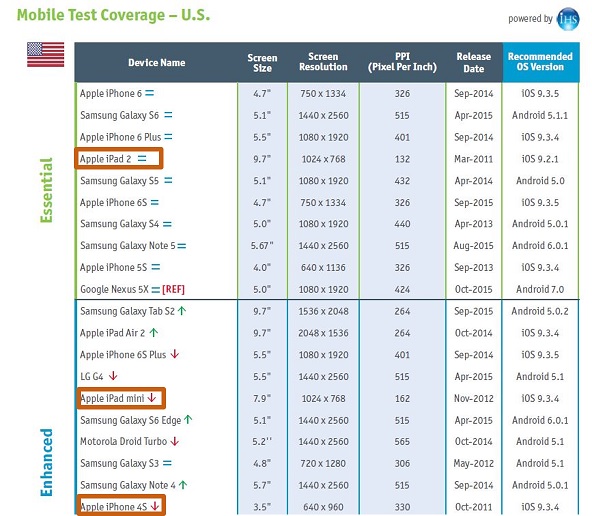Check Point® Software Technologies Ltd.(link is external) announced that U.S. News & World Report has named the company among its 2025-2026 list of Best Companies to Work For(link is external).
The recent iOS 10 release raises a lot of questions about how mobile apps will respond to the updated system, and how developers can ensure an untarnished user experience. One of the biggest challenges that development and testing teams are facing is that certain devices have now been made obsolete. iPad 2, iPad 3rd gen, iPad mini, iPhone 4S, iPod touch 5th gen—none of these devices will update to run iOS 10.
With Apple’s decision to withhold the update from these devices the company considers “outdated,” development and testing teams will need to jump through hoops to maintain a quality user experience.
From the recent Perfecto Digital Test Coverage Index report it's clear that at least iPad 2, iPhone 4S and iPad mini are still among the most-used devices in various markets, including the U.S. (see below):

It’s safe to assume that withholding the update from these popular devices may lead to a lower adoption rate for the new OS — large groups of users will continue to use the iPad 2, iPad Mini and iPhone 4S, and will be unable to make the switch. The end result? We're going to see growing iOS fragmentation in various markets, and complex testing ahead.
In preparation for this mobile testing overhaul, developers need to take a look at their existing testing labs and plans, and alter them to fit the new market matrix.
Automate Across Operating Systems
With iOS 10 comes the new version of Mac’s OS Sierra and Safari 10. These new operating systems will need to be tested across iOS 10 devises, and will require additional lab configurations in your overall testing activities. To ensure quality across operating systems, teams should do a full regression of the scripts that were used to run on iOS 9 against iOS 10, and fine tune to make sure the scripts can run on both platforms until the next release.
Test Across Devices
Teams will need to sustain their test automation and development activities on iOS 10 devices and iOS 9 critical devices. This means that teams will need to support the new iPhone 7 and iPhone 7 Plus, along with other Apple devices that will run iOS 10. Unless you have an automated and continuous lab setup to test efficiently across an array of devices, most teams should expect a latency in testing activities.
Ensure Proper Lab Environments
To debug your app across devices, and ensure that it’ll work in parallel across iOS 9 and iOS 10, teams need to prepare environments with the new permutations. This includes both new Safari and Mac OS versions, new Xcode versions for developers, and of course, having new devices, smartphones and tablets with both iOS 9 and iOS 10 tested side by side.
Prepare for Added Complexity with Appium Framework
For teams building tests for iOS using Appium 1.6, things just got a bit more complicated. In iOS 10, Apple dropped its Instruments support and UIAutomation, moving its automation solution towards the new XCUITest framework. This change impacts existing Appium scripts that leverage Apple Instruments and UIAutomation framework, and will cause execution problems and compatibility issues when trying to run them on iOS 10/iPhone 7.
Now consider the growing iOS fragmentation and we’re left with a second layer of complexity. For devices that are no longer supported by iOS 10, existing Appium scripts that use the old UIAutomation framework are still relevant. That means that teams will have to migrate scripts to the new framework, or maintain both the old one for older devices and the new one for newer devices.
As testing roadblocks pop up with the iOS 10 release, end users still expect their mobile apps to perform seamlessly — so it’s time for developers to rise to the challenge.
Eran Kinsbruner is the Technical Evangelist for Perfecto.
Industry News
Postman announced new capabilities that make it dramatically easier to design, test, deploy, and monitor AI agents and the APIs they rely on.
Opsera announced the expansion of its partnership with Databricks.
Postman announced Agent Mode, an AI-native assistant that delivers real productivity gains across the entire API lifecycle.
Progress Software announced the Q2 2025 release of Progress® Telerik® and Progress® Kendo UI®, the .NET and JavaScript UI libraries for modern application development.
Voltage Park announced the launch of its managed Kubernetes service.
Cobalt announced a set of powerful product enhancements within the Cobalt Offensive Security Platform aimed at helping customers scale security testing with greater clarity, automation, and control.
LambdaTest announced its partnership with Assembla, a cloud-based platform for version control and project management.
Salt Security unveiled Salt Illuminate, a platform that redefines how organizations adopt API security.
Workday announced a new unified, AI developer toolset to bring the power of Workday Illuminate directly into the hands of customer and partner developers, enabling them to easily customize and connect AI apps and agents on the Workday platform.
Pegasystems introduced Pega Agentic Process Fabric™, a service that orchestrates all AI agents and systems across an open agentic network for more reliable and accurate automation.
Fivetran announced that its Connector SDK now supports custom connectors for any data source.
Copado announced that Copado Robotic Testing is available in AWS Marketplace, a digital catalog with thousands of software listings from independent software vendors that make it easy to find, test, buy, and deploy software that runs on Amazon Web Services (AWS).
Check Point® Software Technologies Ltd.(link is external) announced major advancements to its family of Quantum Force Security Gateways(link is external).
Sauce Labs announced the general availability of iOS 18 testing on its Virtual Device Cloud (VDC).




